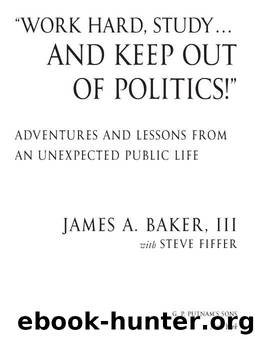'Work Hard, Study...and Keep Out of Politics!' by James A. Baker

Author:James A. Baker [Baker, James Robert]
Language: eng
Format: epub
Publisher: Penguin Publishing Group
Published: 2006-10-05T00:00:00+00:00
IF TWO other presidentsâNixon and Reaganâhad had their way, I might not have been able to help George make his run for the presidency against the Democratsâ Michael Dukakis in 1988. A history refresher first.
Georgeâs path to the White House started with the â88 Republican primaries. Although he was a two-term vice president and the clear front-runner, seven candidates lined up against himâBob Dole, Jack Kemp, Pat Robertson, Howard Baker, Al Haig, Don Rumsfeld, and Pierre âPeteâ du Pont. The race did not begin well. George finished third in the Iowa caucuses. No surprise that Dole won. He was from neighboring Kansas and, as Senate majority leader, was good at delivering for Midwest farmers. But few expected televangelist Pat Robertson to take second place. He did a good job of getting his supporters to the Iowa caucuses.
The flight from Iowa to New Hampshire, the first primary state, was glum, but George kept his composure, campaigned hard, and regained momentum by winning there, just as Ronald Reagan had done eight years earlier. George then won sixteen out of sixteen primaries on Super Tuesday, March 8. That sewed it up.
Former New Jersey senator Nick Brady chaired the Bush effort. Lee Atwater was campaign manager. Georgeâs chief of staff, Craig Fuller, pollster Bob Teeter, finance chairman Bob Mosbacher, and media expert Roger Ailes were also members of the brain trust. Within the campaign, they were called the âGang of Six,â or âG-6.â I watched it all from the sidelines at Treasury. Every once in a while I was asked to contribute my two centsâ worth to the campaign. Generally, however, I tended to my knitting at Treasury and George and the G-6 tended to the campaign.
Because of my long friendship with George and my experience in running presidential campaigns (including his in 1979-1980), conventional wisdom was that I would resign from Treasury before the party convention in mid-August to run the fall general election campaign. But Richard Nixon thought that was a bad idea. On May 15, the former president said in a letter to George that it âwould be a serious mistakeâ for Baker to âtake a leave of absenceâ and join the campaign. âThe an-tis in the media would take it as a lack of confidence in your ability to win and too much deference to Reagan,â Nixon advised George.
Interesting. Having entered the Reagan administration with the reputation of being the vice presidentâs man, I was now seen, at least by the politically savvy Nixon, as the presidentâs guy.
George had obviously asked Nixon for his opinion about my taking on the fall campaign. Nixonâs reference in his letter to a âleave of absenceâ reflected perhaps how much things had changed after Watergate. By 1988, no cabinet official could just take a leave, as opposed to resigning from government, to run the presidential campaign of another cabinet or constitutional officer. Even if a way could have been found to do it legally, a leave of absence would have given the Democrats a political club.
Download
This site does not store any files on its server. We only index and link to content provided by other sites. Please contact the content providers to delete copyright contents if any and email us, we'll remove relevant links or contents immediately.
| Military | Political |
| Presidents & Heads of State | Religious |
| Rich & Famous | Royalty |
| Social Activists |
Waking Up in Heaven: A True Story of Brokenness, Heaven, and Life Again by McVea Crystal & Tresniowski Alex(37812)
Empire of the Sikhs by Patwant Singh(23086)
We're Going to Need More Wine by Gabrielle Union(19046)
Hans Sturm: A Soldier's Odyssey on the Eastern Front by Gordon Williamson(18592)
Leonardo da Vinci by Walter Isaacson(13337)
The Radium Girls by Kate Moore(12030)
Tools of Titans by Timothy Ferriss(8398)
Educated by Tara Westover(8054)
How to Be a Bawse: A Guide to Conquering Life by Lilly Singh(7486)
Permanent Record by Edward Snowden(5848)
The Last Black Unicorn by Tiffany Haddish(5639)
The Rise and Fall of Senator Joe McCarthy by James Cross Giblin(5281)
Promise Me, Dad by Joe Biden(5154)
The Wind in My Hair by Masih Alinejad(5095)
A Higher Loyalty: Truth, Lies, and Leadership by James Comey(4964)
The Crown by Robert Lacey(4817)
The Iron Duke by The Iron Duke(4358)
Joan of Arc by Mary Gordon(4115)
Stalin by Stephen Kotkin(3969)
